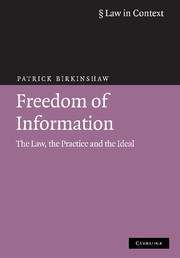Book contents
- Frontmatter
- Contents
- Preface
- Table of statutes
- Table of cases
- Introduction
- 1 Persistent themes and novel problems
- 2 Information and national security
- 3 Government and information: a historical development
- 4 The Freedom of Information Act 2000
- 5 The exemptions
- 6 Decisions and Appeals on FOI Exemptions
- 7 Access to environmental information
- 8 Privacy, access and data protection
- 9 Claims and counterclaims
- 10 Secrecy and access in the European Union
- 11 Openness, information and the courts
- 12 Freedom of information: overseas experience
- 13 Conclusion
- Index
4 - The Freedom of Information Act 2000
Published online by Cambridge University Press: 05 June 2012
- Frontmatter
- Contents
- Preface
- Table of statutes
- Table of cases
- Introduction
- 1 Persistent themes and novel problems
- 2 Information and national security
- 3 Government and information: a historical development
- 4 The Freedom of Information Act 2000
- 5 The exemptions
- 6 Decisions and Appeals on FOI Exemptions
- 7 Access to environmental information
- 8 Privacy, access and data protection
- 9 Claims and counterclaims
- 10 Secrecy and access in the European Union
- 11 Openness, information and the courts
- 12 Freedom of information: overseas experience
- 13 Conclusion
- Index
Summary
On 30 November 2000, the Freedom of Information Bill was given Royal Assent to become the Freedom of Information Act 2000 (FOIA). Section 1 of the Act has been described by the Information Tribunal (IT) as a ‘new fundamental right to information’. The bill had been before Parliament for over a year. Prior to that, the White Paper on Access to Information and then a draft bill and consultation paper, had been scrutinised by the Select Committee on Public Administration in the Commons as well as, in the case of the latter, by a special committee of the House of Lords. In 1966, the Fulton report had recommended ways of removing unnecessary secrecy from public life. Since 1974, and throughout the long years of opposition, the Labour Party had supported numerous Freedom of Information (FOI) bills. These would have created a right for an Information Commissioner to enforce the disclosure of information and would also have amended the Official Secrets Act (OSA).
Reluctant support was given to a Private Member's bill in 1979 by Prime Minister Callaghan immediately before the loss of office to Mrs Thatcher. Neil Kinnock stated in 1992 that a FOI Bill would be among the first bills of an incoming Labour Government. For Tony Blair FOI legislation was essential to bring about a culture change in British government. It would be a signal of a ‘new relationship’ between the people and government.
- Type
- Chapter
- Information
- Freedom of InformationThe Law, the Practice and the Ideal, pp. 118 - 154Publisher: Cambridge University PressPrint publication year: 2010



